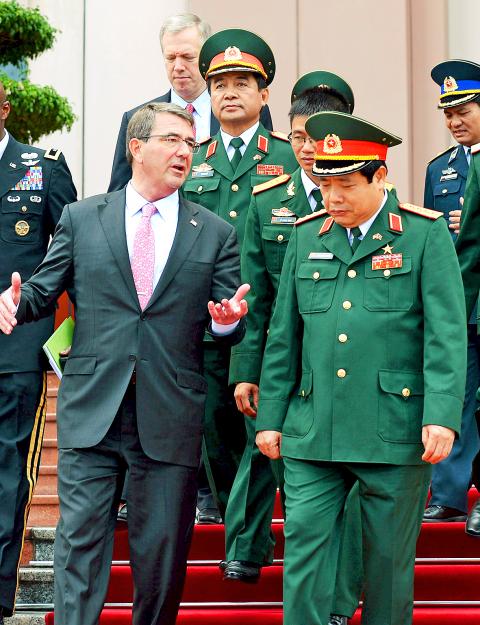A Vietnamese military band yesterday performed a rousing Star Spangled Banner as US Secretary of Defense Ashton Carter arrived for talks at the Ministry of Defense in Hanoi.
Once inconceivable, such displays between the wartime adversaries are increasingly common as Vietnam frets over China.
Carter and his counterpart, Vietnamese Minister of Defense Phung Quang Thanh, later signed a “joint vision statement” pledging to expand defense trade — including possible coproduction — and collaborate on maritime security.

Photo: Reuters
“We are both committed to deepening our defense relationship,” Carter said. “We had a very in-depth discussion that extended well over an hour-and-a-half because there is so much we are doing together.”
Carter’s Vietnam stop, midway through a 10-day Asian swing, was a signal to China that its South China Sea island-building campaign is alienating its neighbors. However, the first visit to Hanoi by a US defense secretary since 2012 was also a reminder of the limits of the burgeoning US-Vietnam relationship.
The new vision statement, which builds on an accord from 2011, is not legally binding. New US arms sales have been slow to develop since the administration of US President Barack Obama last fall partially lifted a long-standing ban on military sales to Vietnam. Hanoi has reportedly been baffled by Pentagon procedures.
In Washington, expanded arms sales are opposed by Human Rights Watch, which said Vietnam’s rights record “remains weak in all key areas.”
Some older members of the Vietnamese politburo, who recall the US as the enemy, are skeptical of a complete turnabout, and while Vietnam is wary of Chinese domination, China remains its top trading partner and an important source of capital.
“This is a piece of complex systems engineering,” said Dean Cheng (成斌), an Asian affairs specialist at the Heritage Foundation in Washington. “There are many, many moving parts, not just China and the US. The whole area is very much in flux.”
With 42 percent of Vietnamese no more than 24 years old, wartime memories are overshadowed by contemporary worries about China.
Still, Vietnam’s US$90 billion in two-way trade with China is more than double its annual cross-border commerce with the US, and more than 10 percent of foreign investment in Vietnam comes from Chinese companies.

The Taiwanese passport ranked 33rd in a global listing of passports by convenience this month, rising three places from last month’s ranking, but matching its position in January last year. The Henley Passport Index, an international ranking of passports by the number of designations its holder can travel to without a visa, showed that the Taiwan passport enables holders to travel to 139 countries and territories without a visa. Singapore’s passport was ranked the most powerful with visa-free access to 192 destinations out of 227, according to the index published on Tuesday by UK-based migration investment consultancy firm Henley and Partners. Japan’s and

NATIONAL SECURITY THREAT: An official said that Guan Guan’s comments had gone beyond the threshold of free speech, as she advocated for the destruction of the ROC China-born media influencer Guan Guan’s (關關) residency permit has been revoked for repeatedly posting pro-China content that threatens national security, the National Immigration Agency said yesterday. Guan Guan has said many controversial things in her videos posted to Douyin (抖音), including “the red flag will soon be painted all over Taiwan” and “Taiwan is an inseparable part of China,” while expressing hope for expedited “reunification.” The agency received multiple reports alleging that Guan Guan had advocated for armed reunification last year. After investigating, the agency last month issued a notice requiring her to appear and account for her actions. Guan Guan appeared as required,

Japan and the Philippines yesterday signed a defense pact that would allow the tax-free provision of ammunition, fuel, food and other necessities when their forces stage joint training to boost deterrence against China’s growing aggression in the region and to bolster their preparation for natural disasters. Japan has faced increasing political, trade and security tensions with China, which was angered by Japanese Prime Minister Sanae Takaichi’s remark that a Chinese attack on Taiwan would be a survival-threatening situation for Japan, triggering a military response. Japan and the Philippines have also had separate territorial conflicts with Beijing in the East and South China

A strong cold air mass is expected to arrive tonight, bringing a change in weather and a drop in temperature, the Central Weather Administration (CWA) said. The coldest time would be early on Thursday morning, with temperatures in some areas dipping as low as 8°C, it said. Daytime highs yesterday were 22°C to 24°C in northern and eastern Taiwan, and about 25°C to 28°C in the central and southern regions, it said. However, nighttime lows would dip to about 15°C to 16°C in central and northern Taiwan as well as the northeast, and 17°C to 19°C elsewhere, it said. Tropical Storm Nokaen, currently